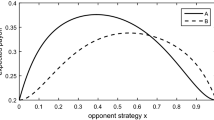4. Conclusions
Over a variety of experimental designs, including vote trading games and committee games with both spatial and finite alternatives, the Competitive Solution has received considerable support. But the experiments that we report here do not replicate that support. Hence, while we maintain our earlier conclusion that neither the V-set nor the bargaining set is an acceptable solution hypothesis, we must now modify considerably our previous enthusiasm for K. In particular, we must now conclude, as we did earlier with V and M 1, that the initial strong support that K receives can be attributed to the particular choice of ordinal and cardinal preferences, and to K's correspondence in those experiments to some more general hypothesis. And, while we remain uncertain as to the form of that hypothesis, we are convinced nevertheless that such an hypothesis exists. Presently, we are unable to conjecture about the form of those hypotheses. The sensitivity of outcomes to cardinal preferences suggests that the several solution theories reviewed do not take adequate account of subjectively perceived lotteries, which may require a more thorough extensive game-form representation for their analysis. Indeed, while we argue elsewhere that the characteristic function form representation used here is adequate only for simple games (McKelvey and Ordeshook, 1982), we may find experimentally that such a representation remains inadequate for all classes of games. Our experiments reveal understandable patterns but our understanding of an explanation for those patterns now is ex post rather than ex ante.
Similar content being viewed by others
REFERENCES
McKelvey, R. D., and Ordeshook, P. C. (1978). Vote trading: An experimental study. Public Choice 35(2): 151–184.
McKelvey, R. D., and Ordeshook, P. C. (1979). An experimental test of several theories of committee decision making under majority rule. In Brams, Schotter, Schwodiauer, et al. (Eds.), Applied game theory. Physica-Verlag.
McKelvey, R. D., Ordeshook, P. C., and Winer, M. (1978). The competitive solution for N-person games without sidepayments. American Political Science Review 72: 599–615.
Author information
Authors and Affiliations
Additional information
This research was supported by National Science Foundation grants to C-MU and CIT. We also wish to recognize the assistance of Ali and Aydan Kutay on the conduct of these experiments.
Rights and permissions
About this article
Cite this article
McKelvey, R.D., Ordeshook, P.C. Some experimental results that fail to support the competitive solution. Public Choice 40, 281–291 (1983). https://doi.org/10.1007/BF00114524
Issue Date:
DOI: https://doi.org/10.1007/BF00114524




